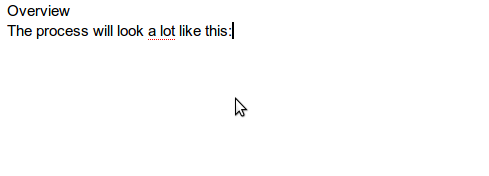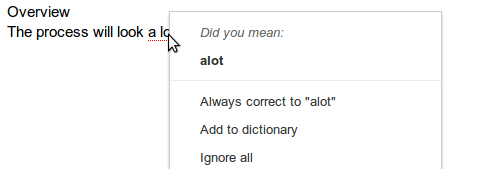published by adam on Thu, 03/14/2013 - 20:51
I encountered a strange bug while using Google Drive today--it suggested auto-correcting "a lot" to "alot." No google, I did not mean "alot." I never mean alot, and neither should you.
Can someone fix this immediately?! I wouldn't have believed it if I hadn't seen it with my own eyes---google wants you to type like a texting teenager, #kthanksomglol.
Here's the close-up:


published by adam on Thu, 05/31/2012 - 15:37
published by adam on Wed, 01/18/2012 - 10:15
This is a repost from the R-bloggers mailing list, with a quick script showing credit rating on a global map. It displays sovereign credit ratings by S&P, Fitch, Moody's, and Chinese rating firm, Dagong, and demonstrates how easy it's become to create beautiful data visualizations.
published by adam on Fri, 09/16/2011 - 10:46
I've posted before about Google correlate in Google Correlate for fun and profit. It's a fantastic platform, but I have not yet discovered any practical use cases for it. This is still the case, but after experimenting with it more, I now have a better idea of what they would need to do (and why they can't do it), to make it more useful.
published by adam on Fri, 07/22/2011 - 07:31
...and great google artists duplicate independently.
Although they surely arrived at it on their own, I do notice a design similarity between google's new search color palette and the one in place at Design and Analytics for several months. The red links, the dark gray, light gray, and white---there's something to it. Looks like Design and Analytics will have to move on to something new soon. (Maybe we should set our logo to primary colors plus green?)
published by adam on Sun, 06/12/2011 - 15:29
...well, if you find the "profit" application, let me know.
Google labs has a new product called Google Correlate. You can read the product's introductory description here (in comic book form). The service takes any time-based data series you give it and matches the Google search queries that have the highest correlation with your series, then does you the additional favor of plotting it on a map---very cool.